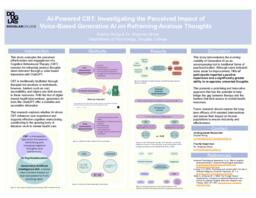Wong, Sophia
Related Works
Content type
Digital Document
Abstract
This mixed-methods study examined the perceived effectiveness and user experience of a voice-delivered cognitive behavioural therapy (CBT) exercise using ChatGPT, with the aim of evaluating its potential as a scalable and accessible mental health support tool. Quantitative data from pre- and post-intervention measures of the Thought Control Questionnaire (Wells & Davies, 1994) revealed significant improvements in adaptive thought control strategies (social control, reappraisal) and decreases in maladaptive strategies (worry, punishment). Qualitative data, analyzed through inductive thematic analysis of open-ended responses, revealed participants' recognition of the intervention's human-like responses, immediacy, and insight. Ethical concerns in mental health care are critical, and in this study, all artificial intelligence (AI) outputs were rated as neutral and appropriate, with 92% of participants feeling neutral or safe while engaging with the exercise. System- and user-level limitations were identified, including interruptions during user input and unfamiliarity with the platform's features and capabilities. Findings support generative AI as a promising adjunct to traditional therapy in expanding access to psychoeducational tools. Future research should explore longitudinal effects, address additional ethical considerations, and evaluate outcomes across diverse populations to ensure equitable and effective use.
Origin Information
Content type
Digital Document
Description / Synopsis
With increasing demand for accessible mental health care, AI-driven interventions offer a scalable solution, yet their effectiveness in delivering cognitive-behavioral therapy (CBT) remains underexplored. This study examines whether AI voice-generated CBT exercises can help users reframe anxious thoughts. Participants engage with an AI-based CBT intervention, with pre- and post-intervention self-report measures assessing anxiety reduction and cognitive restructuring. Anticipated findings suggest AI interventions will be moderately effective, potentially comparable to human-guided CBT, though limitations in personalization and engagement may arise. These results could support AI’s role in expanding mental health accessibility, particularly for under-resourced populations. Poster submission was sponsored by Dr. Shahnaz Winer, (Psychology Department) and was presented at the Coquitlam campus on April 10, 2025, for Student Research Days 2025.
Origin Information


